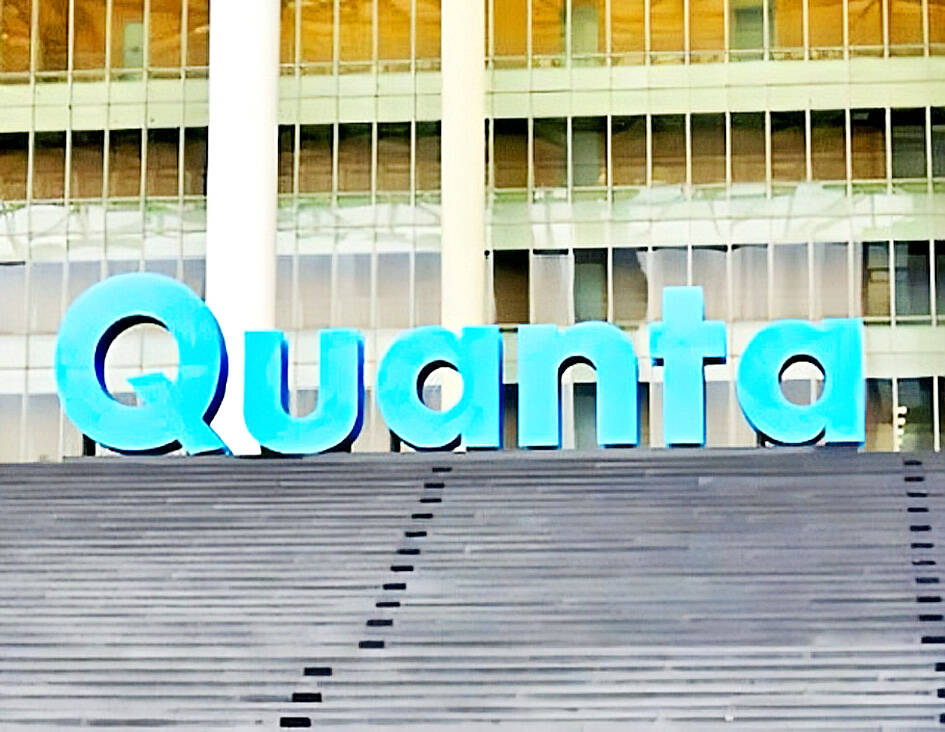Quanta Computer Inc (廣達), the world's biggest contract notebook computer maker, yesterday said it expects high-single-digit quarterly growth in shipments of notebook computers this quarter, driven by front-loading orders ahead of potential US tariff changes.
The company shipped 10.8 million units of notebook computers in the first quarter, down 2.7 percent quarterly but up 2.9 percent annually.
As some clients have advanced their orders in response to tariffs announced by US President Donald Trump on April 2, which were later postponed for 90 days, while others are also adjusting their order schedules due to tariff concerns, there is room for growth in its second-quarter notebook shipments, a Quanta official told the Taipei Times by telephone.

Photo courtesy of Quanta Computer Inc
However, the company’s outlook for notebook shipments in the second half of the year is tempered by tariff uncertainty, pending further US policy developments, said the official, who declined to be named.
Quanta’s projection for its full-year notebook shipments still depends on clients’ order strategy, which varies from company to company, the official said.
Quanta shipped 3.8 million notebooks last month, up 15 percent from the previous month, but down 5 percent from a year earlier, the official said. Cumulative shipments in the first five months of the year totaled 17.9 million notebooks, according to the company.
“As consumer models still account for a large portion of our notebook shipments, purchasing behavior is affected by macroeconomic conditions,” the official said, adding that the company’s sales trend is closely tied to tariff developments.
Quanta, which supplies artificial intelligence (AI) servers powered by Nvidia Corp’s chips, said the outlook for its server business is positive, with the company starting initial shipments of GB200 servers in March and entering mass production of the product in the second quarter, as component supply has stabilized, the official said.
Asked whether Quanta had also encountered overheating with the new servers, after many of its peers reported the issue earlier this year, the official said the company would address such problems proactively.
“These problems test assemblers’ research-and-development capabilities, and could affect overall system stability, but we will do our best to address them,” the official said.
Quanta’s consolidated revenue last month rose 4.1 percent month-on-month, and 58.2 percent year-on-year, to NT$160.24 billion (US$5.36 billion), a record May figure in the company’s history. Cumulative revenue in the first five months increased 74.82 percent year-on-year to NT$799.93 billion, company data showed.

KEEPING UP: The acquisition of a cleanroom in Taiwan would enable Micron to increase production in a market where demand continues to outpace supply, a Micron official said Micron Technology Inc has signed a letter of intent to buy a fabrication site in Taiwan from Powerchip Semiconductor Manufacturing Corp (力積電) for US$1.8 billion to expand its production of memory chips. Micron would take control of the P5 site in Miaoli County’s Tongluo Township (銅鑼) and plans to ramp up DRAM production in phases after the transaction closes in the second quarter, the company said in a statement on Saturday. The acquisition includes an existing 12 inch fab cleanroom of 27,871m2 and would further position Micron to address growing global demand for memory solutions, the company said. Micron expects the transaction to

Nvidia Corp’s GB300 platform is expected to account for 70 to 80 percent of global artificial intelligence (AI) server rack shipments this year, while adoption of its next-generation Vera Rubin 200 platform is to gradually gain momentum after the third quarter of the year, TrendForce Corp (集邦科技) said. Servers based on Nvidia’s GB300 chips entered mass production last quarter and they are expected to become the mainstay models for Taiwanese server manufacturers this year, Trendforce analyst Frank Kung (龔明德) said in an interview. This year is expected to be a breakout year for AI servers based on a variety of chips, as

Global semiconductor stocks advanced yesterday, as comments by Nvidia Corp chief executive officer Jensen Huang (黃仁勳) at Davos, Switzerland, helped reinforce investor enthusiasm for artificial intelligence (AI). Samsung Electronics Co gained as much as 5 percent to an all-time high, helping drive South Korea’s benchmark KOSPI above 5,000 for the first time. That came after the Philadelphia Semiconductor Index rose more than 3 percent to a fresh record on Wednesday, with a boost from Nvidia. The gains came amid broad risk-on trade after US President Donald Trump withdrew his threat of tariffs on some European nations over backing for Greenland. Huang further

HSBC Bank Taiwan Ltd (匯豐台灣商銀) and the Taiwan High Prosecutors Office recently signed a memorandum of understanding (MOU) to enhance cooperation on the suspicious transaction analysis mechanism. This landmark agreement makes HSBC the first foreign bank in Taiwan to establish such a partnership with the High Prosecutors Office, underscoring its commitment to active anti-fraud initiatives, financial inclusion, and the “Treating Customers Fairly” principle. Through this deep public-private collaboration, both parties aim to co-create a secure financial ecosystem via early warning detection and precise fraud prevention technologies. At the signing ceremony, HSBC Taiwan CEO and head of banking Adam Chen (陳志堅)